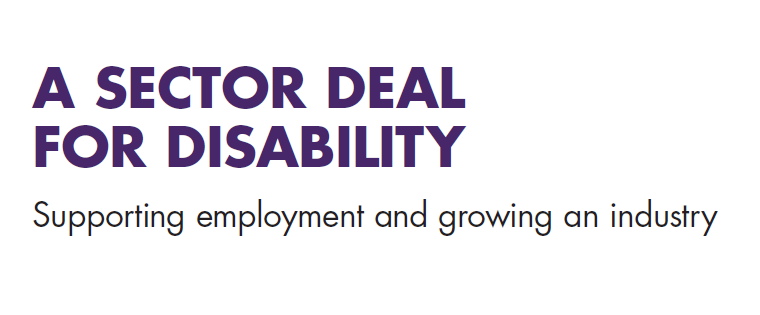A sector deal for disability
Supporting employment and growing an industry
Author: Liam Booth-Smith and Francis Davis |

A sector deal for disability
Supporting employment and growing an industry
Our new report, co-authored with the University of Birmingham, argues that, as part of its efforts to close the disability employment gap, the government should now commit to a sector deal for disability as part of its emerging industrial strategy.
Despite a number of government-backed incentives for employers, still too few are aware of the benefits of employing someone with a disability; the pay gap between disabled and non-disabled people is widening; disabled pupils perform worse than their non-disabled peers and are nearly twice as likely to be NEET. The challenges disabled people face when attempting to enter the workplace are significant. As the government’s Improving Lives green paper makes clear, “there is a lack of practical support to help (disabled) people stay connected to work and get back to work. This has to change”.
While there are positive signs too, to meet the government’s aim of halving the disability employment gap by 2020, policy must change. The behaviour of employers and consumers must change. This report sets out a number of recommendations for central and local governments to help close the disability employment gap.
Recommendations:
Recommendation 1: We call on the government to create a ‘sector deal’ for disability as part of the emerging industrial strategy. It should offer measures to increase the participation of disabled people in the labour market and support the development of the industries and businesses growing up around the needs of disabled people.
Recommendation 2: As part of a sector deal for disability we propose employer national insurance contributions (NIC) for disabled workers should be abolished. There is recent precedent for the targeted removal of employer NIC from a particular demographic group. In his 2013 autumn statement then Chancellor George Osborne announced the abolition of employer national insurance contributions for workers under the age of 21. This principle should now be extended to disabled workers.
Recommendation 3: DWP to establish and chair a new working group on skills, access and employability for people with disabilities to support the sharing of best practice amongst councils, CCGs, schools and colleges locally. Preferably this should utilise existing networks, for example, the Association of Directors of Adult Social Services (ADASS) and the Local Enterprise Partnership network.
Recommendation 4: Infrastructure investment should be made ‘disability sensitive’ seeking wherever possible to create clusters of investment. This could in the first place take the form of ‘Invest to Save’ pilots where HS2 investment, DWP’s spend, BEIS priorities are co-located. Also, Crown Commissioners should be mandated by ministers to provide frameworks and guidelines that make all infrastructure procurement ‘disability deal’ sensitive.
Recommendation 5: Enterprise investment relief should be enhanced for businesses operating in the disability industry where there is a credible export opportunity. In addition where a new start up is owned, significantly co-owned and/ or led by disabled people the SEED scheme should be permitted to apply to a wider range of sectors and business focuses. A particular area of focus should be in unlocking such investment to create a new market in accessible housing for young disabled professionals and in the development of more property based solutions to shared living and holiday and hotel centres with an especial affinity for disabled customers.
Recommendation 6: Therefore we recommend that the Office for Life Sciences (OLS) consider a designated cross government assistive technologies’ unit to specifically champion the investment, both local and global, potential of British tech firms within OLS or as a strategic new initiative built on a ‘disability deal’. We also recommend that as part of an OLS move to recognise assistive technology as ‘more than medical’ they should involve DWP, DEFRA, DCLG, DfIT, DFiD, BEIS and DH as integrated partners. This strategic initiative should take the form of a national working group established to generate involvement from disability organisations, assistive technology ventures of varying sizes, government departments and those local authorities with existing clusters or emerging strong commitments to this niche.
Recommendation 7: We recommend the government establish a national working party to explore how more can be done to build the investment community around the disability sector and how more might get done with less by pooling with other sources of finance and the other reliefs that we have elsewhere in the report.
Recommendation 8: We recommend that the National Citizen Service, Uprising, Catalyst and other government backed next generation leadership initiatives should develop a ‘NXG Disability Track’ and to support this locally every metro Mayor should appoint a ‘Next Generation’ Disability Champion.
Research partner:

